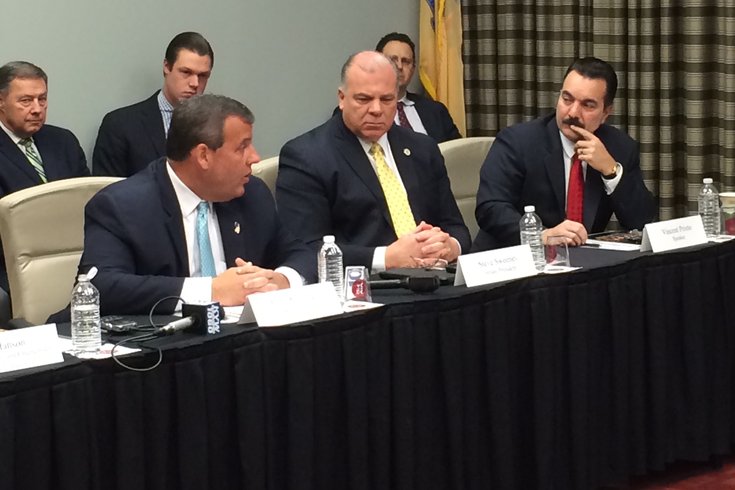
January 22, 2015
 Michael Phillis/for PhillyVoice
Michael Phillis/for PhillyVoice
Governor Christie announces his executive order implementing an emergency manager in Atlantic City on Wednesday.
New Jersey Governor Chris Christie appointed an emergency manager with broad authority to oversee the recovery of Atlantic City on Thursday by signing an executive order that transfers powers from local politicians to individuals appointed by the governor.
“The actions are taken,” Christie said. "The executive order is signed.
“I’m urging all the parties around the table to understand what is at stake here.”
Atlantic City lost thousands of jobs and four of its 12 casinos closed in the past year. It also struggles with a high unemployment rate and a large amount of debt.
The emergency manager has wide latitude to steer the city’s finances and operations. Atlantic City’s Mayor Don Guardian said at a noon press conference that he had not yet seen the executive order and was unsure what formal powers his office still held.
“Until I understand what the authority of that executive order is, it is really premature for me to make any other statements,” Guardian said in a press conference after Christie announced his decision but before the executive order was made public. “We are going to work as cooperatively as we can.”
Installing an emergency manager is a rare move. It was used in Detroit in an effort to save that city from financial collapse. Emergency managers are appointed with additional powers meant to enable them to fix significant issues quickly and deliberately. A common criticism of their appointment is that they usurp the power of elected officials and deprive voters of a say in their own communities.
“We haven’t gotten there,” Christie said in regards to the city’s recovery effort. “And I can’t wait any longer so we need to take more aggressive action.”
“That is the action that I’m taking today.”
Specifically the executive order directs the emergency manager to within 60 days prepare and recommend steps to fix the city’s finances and requires the local government to cooperate with the new office. It is unclear from the language in the order exactly what powers the emergency manager possess - Christie and others steered clear of specifying those on Thursday.
The decision by Christie to assert control over the municipality comes as he publicly ponders a run for president. In the lead up to an election cycle where the economy is the main issue, Atlantic City is a financial problem in Christie’s state, which was not solved from measures he first proposed just after becoming governor in 2010.
Christie made the announcement in the shore town before he convened a third Atlantic City summit to address its recovery. After his comments, the meeting briefly went into private session and was closed to the press. Guardian, a Republican, did not speak in front of the press at the meeting but said afterward he hoped the process going forward would be collaborative and avoided directly condemning the governor’s decision.
Previously, an emergency manager was strongly opposed by Guardian, who said his city’s government had voted to make cuts to bring it in line with the shrunken tax base.
In the mayor’s own recovery plan, he said “We are 100 percent against having an emergency manager installed in Atlantic City.”
Unlike statements made by Guardian, Atlantic City Council President Frank Gilliam said he disagreed with Christie's decision. Gilliam said he thought Guardian should have been given more time to fix the city.
“I don’t believe its necessary,” said Gilliam. “I find it very opposing that we will basically have outsiders come into the city and dictate the direction of the city.”
Assemblyman Vincent Mazzeo, D-Atlantic, said he opposed the installation of an emergency manager but hoped the process would move forward fluidly.
"The appointment of an emergency manager is not something that I support, but I will work with him and his team in a cooperative manner to fix and reform Atlantic City’s dire property tax situation.," Mazzeo said in a statement.
Christie said he appointed Kevin Lavin to act as emergency manager. Lavin has a history in business restructuring and finance. Christie said he also appointed Kevyn Orr as a consultant. Orr worked as emergency manager during Detroit’s bankruptcy.
“This is urgent,” said Orr emphasizing that he wanted to work alongside elected officials to find solutions. Orr and Lavin did not specify the exact guidelines of their formal authority adding that it was too early to know what actions they would take.
Christie also said he wanted the process to be cooperative.
“We need to work together,” Christie said.
Atlantic City’s local government recently passed cuts to their budget and there are bills pending in the state Legislature aimed at helping Atlantic City.
Senate President Stephen Sweeney, D-Gloucester, proposed legislation to stabilize the city’s tax revenue, which funds much of the local government. As property values continue to fall in the city, the casinos have appealed their tax bills and often won - their victories have made predicting revenue difficult. Sweeney’s plan would peg overall casino revenues to total tax payments, which he said would help.
Christie praised the efforts of legislators but said more was needed.